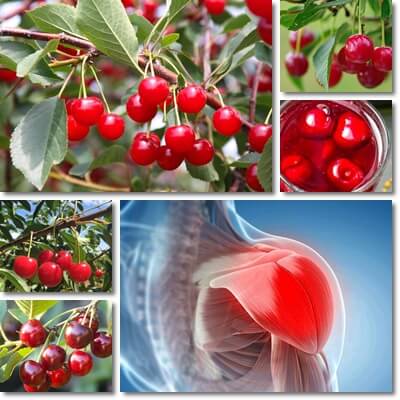Cherries are the new best pre and post-workout recovery food. If you were looking for what to eat and drink before and after working out, know that cherries and cherry juice are it. Studies show the fruit and its juice can speed recovery of muscles after a workout, reduce exercise-associated muscle soreness and pain as well as strength loss post-workout. Basically, eating cherries and drinking cherry juice for a few days before and after a workout session helps sore muscles recover faster, benefits associated with the high content of anthocyanin antioxidants in the fruit and its juice, among other bioactive anti-inflammatory components.
Why are cherries good before and after a workout?
What makes cherries, and cherry juice, good before and after a workout is their content of biologically active antioxidant and anti-inflammatory components, most notably anthocyanin antioxidants. Anthocyanins are a group of pigmented antioxidants responsible for red, blue, purple and black colors in our food, including cherry and cherry juice. Studies show anthocyanins have both antioxidant properties, preventing, reducing and repairing cell damage, and anti-inflammatory properties, lowering levels of several inflammation markers in the body.

In other words, the pigmented antioxidants responsible for the color of ripe cherries and cherry juice is what most helps sore muscles recover faster post-workout, speeding recovery of muscles after exercise and restoring normal muscle function. Other beneficial components include dietary minerals (magnesium, potassium, calcium), vitamins (A, C, B) beta-carotene, ursolic, coumaric, ferulic and caffeic acids, quercetin, queritrin etc.
How can eating cherries aid with post-workout recovery?
Eating fresh cherries or drinking cherry juice helps sore muscles recover faster post-workout. Cherry and cherry juice help reduce symptoms of muscle damage associated with intense physical exercise, including muscle soreness, aches and pain, as well as muscle cramps, spasms and contractions and muscle stiffness. The fruit and fruit juice further help reduce strength loss post-workout and encourage a faster recovery of normal muscle function.
The bulk of benefits of cherry and cherry juice for muscle recovery come from antioxidant anthocyanins which help contain oxidative stress associated with muscle damage, as well as reduce inflammation markers in the body and promote cell repair processes vital for muscle recovery following intense physical exercise.
However, strong anti-inflammatory effects have been identified in cherry varieties with lower anthocyanin values such as Rainier cherries and Gold yellow cherries which means there is great anti-inflammatory potential in cherry colors other than red and black cherries and components other than anthocyanins.

(1) Cherries for muscle soreness and pain
Exercising normally causes some degree of muscle soreness, tenderness and associated aches and pain. Most workout routines target specific sets of muscles. The intensity and repetitiveness of workout routines stress out the muscle tissue.
The result is discomfort that may range from mild soreness or tenderness to aches and pain. In case of excessive strain on the muscles, small tears in the muscle and damage to muscle fibers occur which, in turn, generate inflammation in the body and pain.
What cherries and cherry juice do is reduce levels of circulating inflammation markers, including Interleukin 6, Interleukin 8, tumor necrosis factor alpha and the cyclooxygenase-1 (COX-1) and cyclooxygenase-2 (COX-2) inflammatory enzymes, nitric oxide, C-reactive protein, regulated upon activation, normal T-cell expressed, and secreted (RANTES) (source 1, source 2).
Different cherry varieties exhibit stronger anti-inflammatory activities against specific inflammation markers compared to others. For example, extracts of yellow cherries such as Rainier cherries and Gold exhibit stronger anti-inflammatory activity against inflammation markers COX-1 and COX-2 (source 3).
By inhibiting inflammation pathways, cherries and cherry juice reduce exercise-induced muscle soreness and pain and associated symptoms such as muscle tenderness, muscle cramps, spasms and contractions. While anthocyanin antioxidants (and other antioxidants and bioactive components) account for the decrease in exercise-related muscle soreness and pain, it’s potassium and magnesium in cherries and especially cherry juice that help most with muscle cramps, spasms and painful contractions post-exercise.
(2) Cherries for muscle stiffness
Muscle stiffness is a feeling of tightness and reduced mobility in your muscles and is common after working out. While it may also indicate an injury to a muscle, ligament or tendon, muscle stiffness is known to be brought on by intense exercise routines and the associated overuse of the muscles. Consumption of cherries or cherry juice pre and post-workout both reduces inflammation markers that contribute to the stiffness and provides reparative dietary elements such as minerals (potassium, magnesium), vitamins (vitamin A, vitamin C, B vitamins), antioxidants and beneficial polyphenols.
(3) Cherries for strength loss post-workout
Strength loss post-workout is a normal side effect of the overuse of muscles and associated muscle damage. Eating cherries and drinking cherry juice has been found to reduce strength loss post-workout, contributing to a faster recovery and increased endurance promoting better exercise performance.
In a study, 12 oz of a cherry juice blend or a placebo was consumed twice a day for eight consecutive days by 14 male college students. According to results, the cherry juice group showed less strength loss (4% strength loss compared to 22% in the placebo group) as well as decreased exercise-induced muscle pain.
In another study, 54 healthy runners received 355 ml bottles of tart cherry juice or placebo cherry-like drink twice a day for 7 days prior to a running event and on the day of the race. Each bottle provided at least 40 mg of anthocyanin antioxidants and was the equivalent of 45-50 cherries. The cherry juice group reported a significantly reduced pain compared to the placebo group.
(4) Cherries for muscle recovery
Cherries and cherry juice help speed muscle recovery post-workout in addition to minimizing strength loss and decreasing muscle soreness and pain. The fruit and its juice have even been recommended for bodybuilding to aid with muscle recovery.
The pathways through which cherries and cherry juice products promote and accelerate muscle recovery following intense physical exercise include reduction of circulating inflammation markers and oxidative stress, inhibition of lipid peroxidation and stimulation of reparative processes via antioxidants (source).
Cherry components that accelerate recovery of muscles after exercise are antioxidants – anthocyanin antioxidants and, to a lesser extent, beta-carotene and other beneficial polyphenols with antioxidant properties.
Because there is significant exercise-induced oxidative damage to muscle cells, bioactive anthocyanin antioxidants help reduce oxidative stress and initiate reparative processes at cell level which promote muscle recovery post-workout.
Sweet or tart cherries for muscle recovery?
It has been argued that not all types of cherries are equally good for speeding up muscle recovery following intense physical exercise. Between sweet and tart cherries, the latter are regarded as the better choice. C
onsumption of tart cherries and especially tart cherry juice has been reported to improve muscle recovery post-workout and reduce loss of strength, soreness and pain.
However, both cherry varieties, sweet and tart, hold important antioxidant and anti-inflammatory benefits and actively contribute to a faster muscle recovery following exercise.
So if you don’t have the option to choose, know that either variety will provide quantifiable benefits for muscle recovery.
Pre or post-workout?
When is the best time to eat cherries or drink cherry juice for a faster muscle recovery? For best results, cherries and cherry juice should be consumed both pre and post-workout, for several days leading up to a workout session and several days after. Studies show half or most of the ingested anthocyanins (the primary bioactive component in the fruit and fruit juice) degrade and disappear from the gastrointestinal tract in around 4 hours, hence the need to consume the fruit or fruit juice close in time to workout sessions to enjoy their benefits for muscle recovery.
Cherry juice and tart cherry juice in particular may be a source of side effects such as acid reflux and heartburn, especially when consumed right before a workout session.
If this is the case, you can have the fresh fruit pre-workout and the juice post-workout, or just the fruit if you don’t tolerate the juice well, or eat fresh cherries only after the workout.
